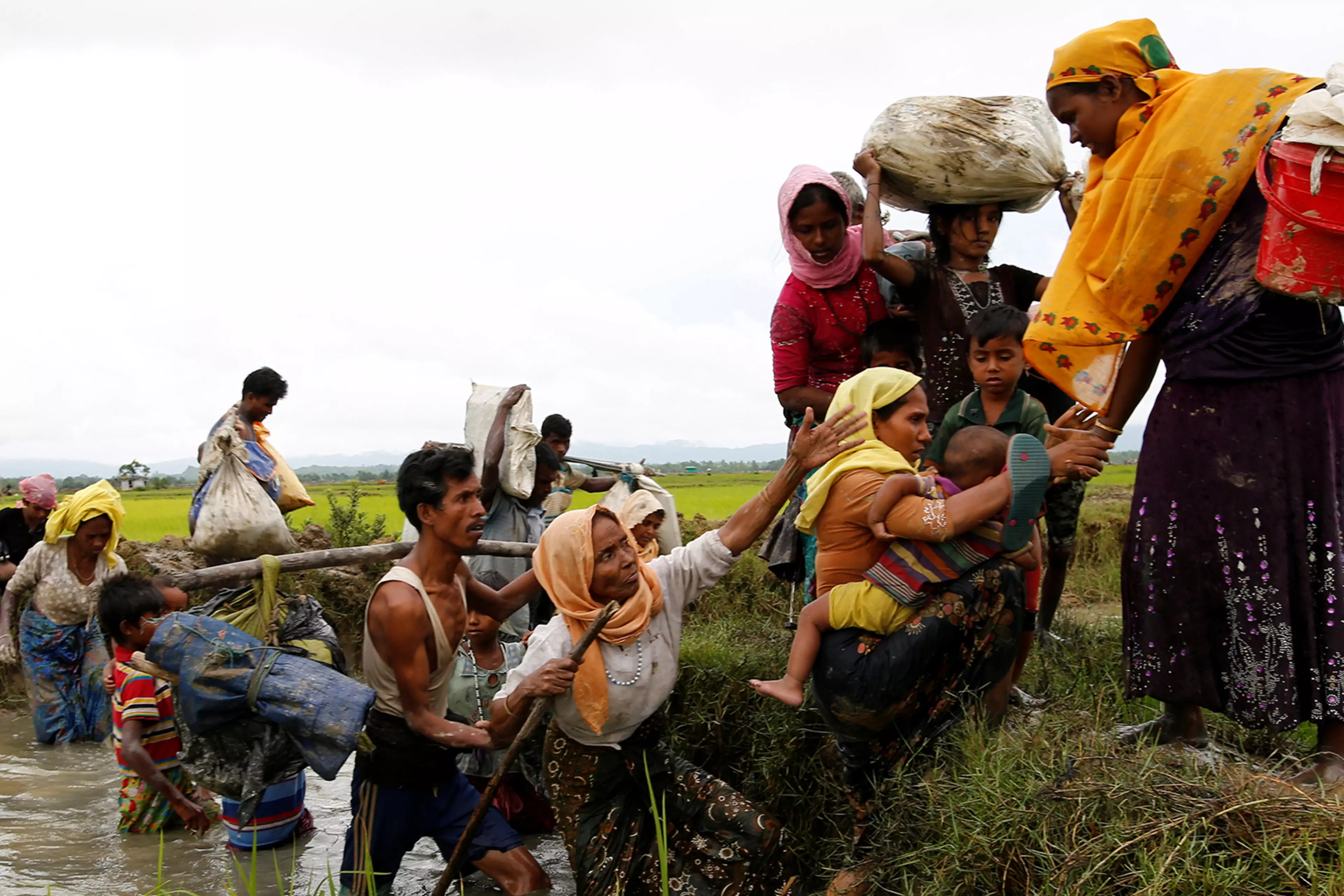By Ashis Biswas
Random arrests of illegal Rohingya settlers from different Indian states remain a cause for concern among Indian security analysts. Mostly the detection of illegal aliens is more a matter of chance rather than the outcome of real time intelligence inputs.
Subsequent official action taken either by central law enforcing agencies or various state governments, mostly ends in herding those arrested to special camps. If the official objective is to stop the continuing clandestine trafficking of Rohingyas to India, such nominal actions hardly improve existing levels of security that vary from state to state. None other than the Union Home Minister Mr Amit Shah has accused the West Bengal Government of not doing enough to prevent illegal immigration into India, during his recent visit to the state.
While the ruling Trinamool Congress vigorously denies this, what cannot be denied is that the Rohingya Muslim exodus from Myanmar’s Rakhine province into neighbouring South Asian countries has emerged as an abiding irritant in regional political relations involving Myanmar, Bangladesh and India.
Also it is hard to dispel the general perception among commoners as well as political observers that Government of India is yet to come up with an adequate policy response to the crisis of the unending Rohingya exodus. What GOI authorities eventually want to do with the Rohingyas stranded here remains unclear, as months and years pass.
For the record, in July 2021, there was a declaration in Parliament that any foreigner found without identification on Indian soil would be regarded as a potential threat to national security. As for Rohingyas, the official stand was that all would be repatriated to Myanmar, where Burmese authorities must accept all responsibility for their former citizens.
This approach is broadly aligned with the position taken by Bangladesh. Dhaka in a remarkable gesture has so far played host to an estimated 1 million-plus Muslim refugees who escaped from multiple ethnic attacks tantamount to genocide carried out in Myanmar in recent times. Bangladesh is understandably more focused than India on all issues relating to the Rohingyas and has been pressing Myanmar relentlessly to take back its own citizens.
There is greater concern in Bangladesh than in India about the immediate as well as long term security implications of the prolonged settlement of a volatile ethnic group with its own definite non-Bengali cultural background — a fact conveniently ignored/denied by its Buddhist majority- Burmese tormentors.
A brief analysis of some disturbing trends/incidents seen in Bangladesh following the arrival of large numbers of Rohingyas in the country, as reported in various local media accounts, assumes considerable significance. Dhaka-based experts are deeply anxious about the long term negative impact of Islamic extremism and fanaticism as seen among a section of Rohingyas.
Their observations/findings on the long term impact of the Rohingya refugee crisis should be of interest among analysts in India as well — particularly in the context of the random detection and arrests, as mentioned before, of bands of Rohingyas moving round in different parts of India.
First, a few instances of detection/ arrests of Rohingyas in India , by no means exhaustive . Earlier this month, 24 Rohingyas were rounded up from Unakoti district of Tripura, including a few people with UNHRC refugee cards. Apparently the group wanted to go to Bangladesh, for reasons not known, but they had come all the way from Jammu and Kashmir.
Only days before, three Rohingyas were caught from Dharmanagar railway station, without any papers whatsoever. It is hazardous enough to ascertain the total extent of illegal Rohingya /movement activities in India on the basis of accidental arrests made . But there are reports that during 2019, at least 53 Rohingyas had been apprehended in Tripura alone.
Last year, 12 Rohingyas were rounded up from Ramban area in Jammu and Kashmir. Some had been staying there in different Masjids for over 8 years! A few had joined the local Tablighi Jamaat, defying a GOI ban on Rohingyas/other foreigners from joining local political/social groups.
From Bangalore, Karnataka, National Investigation Agency personnel busted a ring of 6 people engaged in setting up supporting cells/modules for Rohingyas settling in India. Shadowy operatives helped them from Cachar in Assam while humanitarian groups in Meghalaya and West Bengal provided shelter and temporary relief from law enforcing agencies. Assam police frequently rounded up smaller groups of Rohingyas who received support from people in the three Barak valley districts. Most had crossed over from Bangladesh.
Apart from fake UNHRC papers, Aadhaar/PAN cards, mobiles and other equipment were also seized from some of those arrested. Regarding their activities, some women were known to have been working as sex workers, while a few had been victims of women trafficking. As for men, some were stopped from illegally working at various odd jobs in the informal sector of the economy in Telangana, Delhi, and Maharashtra. A few had been arrested in Mizoram.
It would be utterly unfair to accuse the much harassed and perhaps the most cruelly exploited stateless people such as the Rohingya Muslims of wholesale criminality of behaviour.
However, a few radicalized elements had been held in Jammu for religious preaching/conversion activities. A criminal fringe has been known whether in India or Bangladesh to dabble in illegal trafficking of women and children, not to mention arms and drugs smuggling and gun running. To some extent again, this was inevitable: Rohingyas are not legally permitted to work anywhere in India, over fears of repercussions on local sentiments or the economy. Both in Bangladesh and parts of India there have been reports of Rohingyas offering their labour at house building or other work at well below normal minimum wages.
On a more serious level, Rohingya activists /planners were actively involved in the armed attack on a Buddhist holy site in Bihar a few years ago. It was carried out in retaliation to a particularly vicious ethnic attack in Myanmar some time back.
As a Kolkata-based observer said, it was by no means the case that that the displaced stateless people from Myanmar were fundamentally crime-prone, communal or violent. With equal justice, it could not be denied that a few among thousands of Rohingyas currently found in different parts of India, could very well have their own political/other agenda to sustain them in a new country.
Especially if a large population numbering well over a million had been thrown out violently from their homeland by a ruthless army-ruled dictatorship, such aberrations would be normal. ‘While the extremist and criminal reactions from a few of them would be understandable in a different context, it cannot be ignored that their present activities, whether targeting Buddhists or others, disturb peace and tranquility in India, for which Indians are not at all responsible,’ he said, adding, ‘Surely no government in the world, no matter how sympathetic, would allow such activities on its own soil carried out by illegal foreigners!’ Truly a catch 22 situation!
Interestingly, Bangladeshi analysts, probing deeper into the negative impact of the massive Rohingya exodus to their country, also report fairly widespread criminal and as well as communal activities carried out by some members of the community. Angry Rohingya Muslims had tried to launch massive armed raids against the major Chakma Buddhist settlements in the Chittagong hill tracts area, which were put down with great difficulty by Bangladeshi army and police. A communal riot had broken between Buddhist tribes people and the Rohingyas some time ago.
While there seems to be no easy solution in sight, it seems there is no alternative for Dhaka or Delhi except to continue to press Naypitaw to step up the process of Rohingya return to the Rakhine province and to appeal to all concerned international agencies to show more sympathy for lakhs of innocent people suffering endlessly sans minimum human rights. (IPA Service)

 Sangh Parivar Is Bracing For Next Round Of Battle After Ayodhya
Sangh Parivar Is Bracing For Next Round Of Battle After Ayodhya 